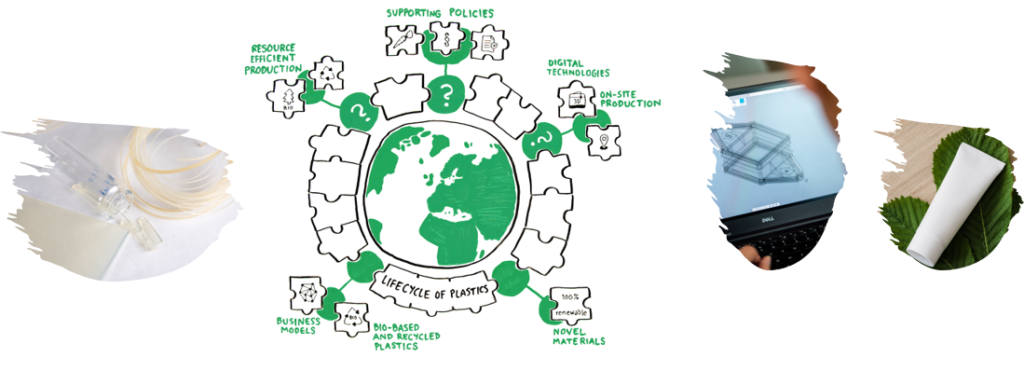Authors: Rosa Maria Ballardini, Juha Vesala and Corinna Casi / University of Lapland
The European Union is currently seeking to tackle the environmental issues that relate to plastics. The measures targeting or affecting plastics include particularly the Single-Use Plastics Directive (2019/904) that is due to implemented in EU Member States by 3 July 2021. EU and Finnish policymakers are considering how the plastics industry could reduce waste and move towards a more sustainable, circular model of operation (see e.g. EU plastics strategy 2018 and Finnish Plastics Roadmap).
These efforts raise various questions that are central also for the ValueBioMat project. They not only raise the question how the sustainability of plastics is to be determined but also how policymakers can support transition towards more sustainable plastics industry, as they significantly affect the incentives and abilities of the industry to develop new materials, business models and sustainable industry practices.
To discuss and raise awareness on these issues, the ValueBioMat project is organizing a seminar on
“Circularity of plastics: experts’ dialogue on sustainable innovations” on Tuesday 25.5, 9:00-12:00.
More info and registration: https://valuebiomat.fi/researchwebinar2021/
The Seminar will be online and it is open to anyone interested. The goal is to create dialogue between industry, policymakers and researchers on the central issues related to renewable and circular plastics, including sustainable innovations, assessment of environmental footprint, stakeholder behavior and certifications in the plastics context. Amongst the speakers is Dr. Jussi Kauppila from the Ministry of Environment, who will share his insights on some of the central legislative and policy developments that are currently ongoing in the EU and in Finland on this topic. The ValueBioMat researchers interviewed Kauppila to already shed light on some of the crucial questions that will be further elaborated in the Seminar.
Interview with Jussi Kauppila:

Jussi Kauppila works as a civil servant at the Finnish Ministry of the Environment. His work entails preparation of legislation and other measures in the policy fields of waste management and material economy. At the moment he is working – almost exclusively − with EU waste package and some parts of SUP Directive. Before his current assignment, Kauppila was a researcher on environmental policy and law.
First, we asked Jussi to summarise the most representative elements of EU and Finnish policy in the context of the circular economy (generally and particularly as concerns plastics). According to him,
“on the EU level the EU plastics levy (or tax) and the Single-Use Plastics (SUP) Directive and the Waste Package (revised waste directives) are likely the most relevant provisions” at the moment.
In fact, Jussi explains,
“the plastics levy makes Member States to pay for non-recycled plastics, so it works as an economic incentive to recycle. On the other hand, the Waste Package (implemented by the Waste Act) will significantly increase door-to-door collection of packaging and other plastic, so at least there will be raw-material available for recycling. Moreover, it will be illegal to incinerate or landfill waste which has been separately collected for reuse or recycling”.
This notwithstanding, Jussi acknowledges that
“there are still many other questions related to viable recycling market” that remain open.
According to Jussi, the SUP Directive is not so central on a general level, even though some parts of it, such as banning certain single use (plastic) products, might very well be crucial to drive innovations, as well as stakeholders’ behaviours and practices. However, as Jussi points out, the implementation of the SUP Directive is currently still in progress, and we thus need to wait and see.
We were then curious to know what – if anything – he would recommend to change in the current global, EU or Finnish policy for renewable and circular plastics.
“I would at least seriously consider moving away from Extended Producer Responsibility (ERP) towards straightforward regulation of products”, Jussi says.
In his view,
“the EPR has a very poor record in terms of product design”.
In his opinion, it would seem more reasonable to try to directly regulate the quality of product instead of pushing towards EPR.
More on this will be elaborated and presented in the above mentioned ValueBioMat upcoming seminar – till then, stay tuned!

